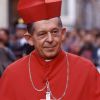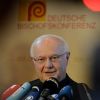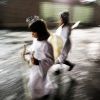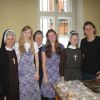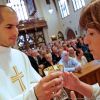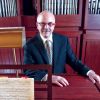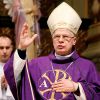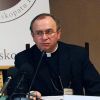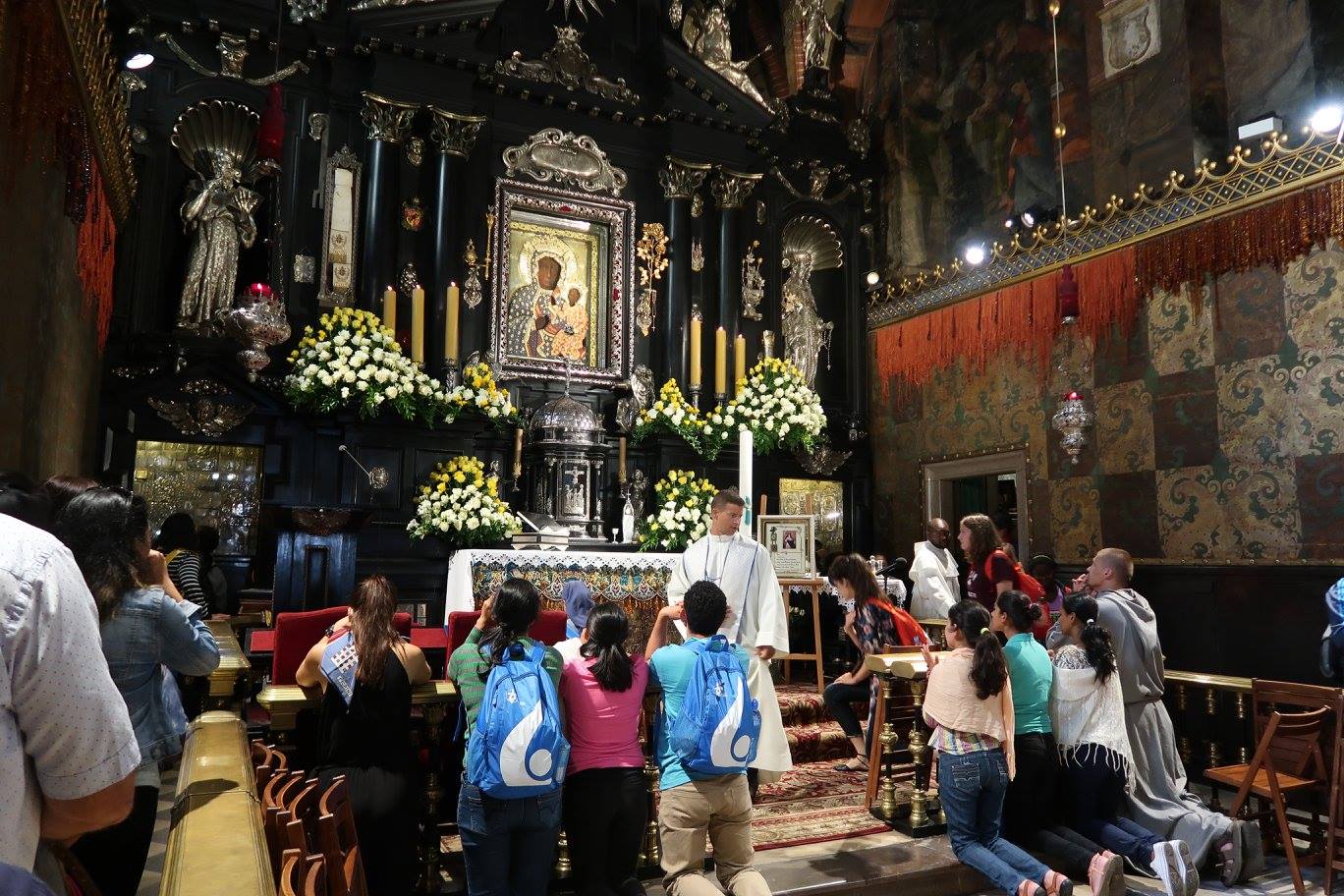Cardinal Glemp headed Church during hard times
WARSAW, Poland - Polish Cardinal Jozef Glemp took over as head of the Polish Church during "hard and uncertain" times, Archbishop Jozef Kowalczyk of Gniezno told hundreds of people at the cardinal's funeral.
Retired Polish primate, Cardinal Glemp, dies at 83
VATICAN CITY - Retired Cardinal Jozef Glemp of Warsaw, who served as primate of the Catholic Church in Poland during the final years of communism and during the restoration of democracy, died Jan. 23 at the age of 83.
German bishops defend exclusion of Catholics who stop paying tax
WARSAW, Poland - The German bishops' conference defended a controversial decree that said Catholics who stop paying a Church membership tax cannot receive sacraments.
"There must be consequences for people who distance themselves from the Church by a public act," said Archbishop Robert Zollitsch of Freiburg, conference president, in defending the Sept. 20 decree.
"Clearly, someone withdrawing from the Church can no longer take advantage of the system like someone who remains a member. We are grateful Rome has given completely clear approval to our stance."
The archbishop said each departure was "painful for the Church," adding that bishops feared many Catholics were unaware of the consequences and would be "open to other solutions."
"The Catholic Church is committed to seeking out every lost person," said Zollitsch, whose remarks were reported by Germany's Die Welt daily.
"At issue, however, is the credibility of the Church's sacramental nature. One cannot be half a member or only partly a member. Either one belongs and commits, or one renounces this."
Catholics make up 30 per cent of Germany's population of 82.3 million, about the same proportion as Protestants.
Interest in the Catholic Church revived after German-born Pope Benedict XVI's April 2005 election, but Church baptisms and weddings continue to decline. Church statistics show that about 13 per cent of Catholics attend Mass weekly, compared with 22 per cent in 1989. Germany's Catholic priesthood and religious orders also are declining in number, according to a bishops' statement in June, despite three homecoming visits by Pope Benedict since his election.
A total of 126,488 Catholics asked to stop paying the membership tax and be removed from registers in the 27 German dioceses during 2011, according to the bishops' conference. In 2010, some 180,000 Catholics took the same step.
German newspapers said the Pope's native Bavaria region had suffered the worst losses. The dioceses of Augsburg, Bamberg, Eichstatt, Passau and Wurzburg reported a 70 per cent increase in departures in 2010, the height of the clergy sexual abuse scandal.
Introduced in the 19th century, the membership tax earns the German Church about $6 billion annually, making it one of the world's wealthiest.
In its decree, the bishops' conference said the tax was designed to compensate for state seizures of Church property. The decree said the right to a "civil law withdrawal" ensured "no one is led to Church membership against their will."
"Conscious dissociation from the Church by public act is a grave offense against the Church community," the decree said.
"Whoever declares their withdrawal for whatever reason before the responsible civil authority always violates their duty to preserve a link with the Church, as well as their duty to make a financial contribution so the Church can fulfill its tasks."
The document added that departing Catholics could no longer receive the sacraments of penance, holy Communion, confirmation or anointing of the sick, other than when facing death, or exercise any Church function, including belonging to parish councils or acting as godparents. Marriages would be granted only by a bishop's consent and unrepentant Catholics would be denied church funerals, the decree said.
A press release Sept. 20 said the decree had been approved in August by the Vatican's Congregation for Bishops. It added that parish priests would be asked to write to departing Catholics, inviting them to meet and explain their decision and have the consequences explained.
The Associated Press reported that the Federal Administrative Court in Leipzig, Germany, ruled Sept. 26 that Catholics who opt out of paying religious taxes must automatically leave the Church as well.
The bishops' decree was criticized by Germany's dissenting We are Church movement, which said in a statement Sept. 24 that a "pay to pray" policy sent "the totally wrong signal at the wrong time" when the German bishops were "laboriously trying to regain credibility" after a "decades-long cover-up of abuse scandals."
"Instead of considering the reasons why large numbers are leaving the Church on the ground, this bishops' decree sends a threatening message," the statement said. "This threatened exclusion from community life is a de facto excommunication. It contradicts the sacramental understanding of indelible Church membership through baptism."
Bosnia's Catholic leaders say real dialogue impeded by injustices
Catholic leaders in Bosnia-Herzegovina said real ethnic and religious dialogue is not occurring and not all religions have equal rights.
"Real dialogue" is being impeded by "legalized war crimes and injustices," as well as by failure to implement the peace accord that ended the country's 1992-95 war, said Msgr. Ivo Tomasevic, secretary-general of Bosnian bishops' conference.
Tomasevic welcomed a September interfaith peace appeal, issued in Sarajevo after an international peace meeting sponsored by the Rome-based Sant'Egidio Community gathered 2,000 Catholic, Orthodox, Protestant, Muslim, Jewish, Buddhist and Hindu representatives.
However, in a Sept. 19 interview with Catholic News Service, he said the country still lacks a firm foundation for religious and ethnic co-existence.
"Peace is firstly a gift from God, so it's important all faiths and confessions pray for it together," he said. "But we also need to work for peace, at a time when our Catholic population has almost halved and the Catholic presence in Sarajevo is dwindling year by year."
Tomasevic said participants had expressed a wish to create a zone of peace in Bosnia-Herzegovina, where more than 100,000 people died in the war.
Earlier, the president of the Bosnian bishops' conference told the Croatian daily Vecernji List that he had questioned claims at the meeting that his country offered an example of religious and ethnic reconciliation.
"In no other European country has the plight of Catholics been as dramatic as here — at least half have left, and those who remain have problems finding a roof over their heads, food, jobs and conditions for life," Bosnian Bishop Franjo Komarica of Banja Luka said in the interview, published Sept. 16.
"I pointed this out many times during the meeting and was warned participants knew nothing about these things. I accepted this, although I don't know whether people are uninformed, or rather uninterested."
Bosnian newspapers said Bosnia's Grand Mufti Mustafa Ceric had rejected complaints by Catholic and Orthodox leaders at the meeting that growing Muslim domination had left Christians with no future in Sarajevo.
A statement issued by participants at the end of the Sept. 8-11 meeting said Bosnia was a reminder of hostilities caused by religious and ethnic differences, but also of the "grace of dialogue" and of "how to build the future."
"Religious and national communities in Sarajevo remind us war is a great evil and leaves a poisoned legacy," the statement said. "Although we are different, we unanimously believe different people can live together fruitfully anywhere in the world. This is possible in Sarajevo and elsewhere — we must prepare responsibly for the future."
Catholics made up 18 per cent of the 4.3 million citizens of Bosnia-Herzegovina, with Muslims and Orthodox Serbs constituting 44 per cent and 35 per cent, respectively, before the war, which ended with the formation of separate Serb and Croat-Muslim territories in a united country.
Tomasevic told CNS that religious leaders could not make the political decisions needed to create firmer foundations for peace, adding that he feared the meeting's final statement could be misused by local politicians.
"The peace meeting was all very well, but we still need a more-just society where the three constituent peoples will have equal rights," Tomasevic said.
"It's important we shape consciences so people will be open to dialogue and tolerant of differences. But injustices are occurring not just at the level of power, but in ordinary life as well. Until a better foundation is created, our personal goodness will not be enough."
VATICAN CITY - Team sports such as soccer can educate participants and spectators in important values, including self-sacrifice and respect for one's adversaries, Pope Benedict XVI said in a message to participants in the European Championships soccer tournament.
Group sporting events, he said, are "an important school for educating one in the meaning of respect for others -- including the opposing team -- the spirit of personal sacrifice for the good of the whole group," and in the importance of recognizing the talents and skills of each person on a team.
Felician Sisters inspire students in Krakow
MISSISSAUGA, ONT. - To connect and give back to their school’s founders, Grade 12 students at Holy Name of Mary College School travelled to Krakow, Poland, where the Felician Sisters have a strong community.
From April 25 to May 3, nine students from the Mississauga, Ont., school volunteered at three institutions run by the sisters, soup kitchen, a kindergarten class and a home for the elderly.
“The sisters showed a really transparent joy and love in the name of Jesus,” said Jim McLevey, Grade 12 religion teacher and chaplain. “I was overwhelmed by them and it caught us off guard. The students were really overwhelmed by the beauty of what the sisters are doing and who they are.”
MICHIGAN CITY, Ind. - The issues surrounding the preservation of long-established parishes and the preservation of ethnic traditions are not all that different.
During the awards dinner of the 23rd annual Polish American Priests Association convention in Michigan City April 19, Father Czeslaw Krysa of the Diocese of Buffalo, N.Y., talked about the challenges facing Polonia in America and the impact that challenge is having on the Catholic Church and ethnic neighborhoods.
Canadian Michaelites mark three milestones in 2012
MELROSE, ONT. - Ordinarily committed to a prayerful life of service to others, 46-year-old Fr. Andrew Kowalczyk has clearly had to step outside of his comfort zone this past year as he has endeavoured to make the work of the Michaelite Fathers better known.
Kowalczyk is the provincial of the Canadian delegation of the Poland-based Congregation of St. Michael the Archangel and has been organizing the triple jubilee celebrations the order observes this year.
Music used to ‘bind’ people torn by two Polish tragedies
TORONTO - The Our Lady of Sorrows Chorale and Ecumenical choirs will lift their voices in song April 15 in a memorial concert for the 72nd anniversary of the Katyn Massacre and the second anniversary of the Smolensk tragedy in Poland.
“Music is a force that can bind people or tear them apart,” said Gordon Mansell, music director and organist for Our Lady of Sorrows parish and concert organizer. “It is a language that transcends all others and its meaning can forge close ties and bridge cultures. When great sorrow is experienced, it is the sighs of humanity that call our attention to action.
WARSAW, Poland - A prominent victim of clerical sex abuse has rejected the Polish church's stance that it is following a zero-tolerance policy toward priests and offers moral support for victims.
Ewa Orlowska, whose book about her ordeal, "I Accused a Priest," was published in 2008, charged that the church is holding "victims up to ridicule" while "behaving as if nothing has happened."
Spokesman defends record as Polish bishops prepare to adopt guidelines
WARSAW, Poland - The spokesman for the Polish bishops' conference defended its handling of sexual abuse accusations against Catholic clergy as the bishops prepared to adopt guidelines on the issue.
"The church is the only institution in Poland systematically dealing with this -- no one else is," said Father Jozef Kloch, conference spokesman. "Although we're being used as a whipping boy, we know from data there's a much lower incidence of pedophilia among Catholic priests than clergy from other denominations, as well as teachers, home care employees, sports coaches and, unfortunately, parents and relatives."
WYD Blog
-
Call to arms
If you did not feel empowered by Pope Francis' homily during the welcoming ceremonies at World Youth Day, then you weren't really listening. The…
-
Jesus calls us here to meet him
There’s so much I could say about World Youth Day: I could probably write a short book about my experiences. There are so many…
-
Jesus I trust you
Two weeks ago I left my home in Mission, BC, about an hour outside of Vancouver, and embarked on my pilgrimage to Kraków, Poland.…





















.jpg)









.jpg)


.jpg)





.jpg)
.jpg)















.jpg)





















































.jpg)







.jpg)











